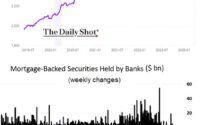Investors are waiting for a consumer collapse: Morning Brief
This is The Takeaway from today’s Morning Brief, which you can sign up to receive in your inbox every morning along with:
As I have often told people who care to ask, the external environment should be one’s observation deck for possible investments.
To that end, I splurged on a $120 pair of low-top Nike dunks on July 4 weekend. What better way to show off how cool your aging 40-year-old-plus self is in the office than by rocking a pair of sweet Nike dunks a day after the manufacturer served up lackluster guidance and the stock sank?
Interestingly, the Foot Locker store where I got these pricey fountains of youth was generally empty. The July Fourth weekend is usually a hotbed of buying activity for things you don’t really need but rather want. And maybe it was in other states, just not at this particular store at this particular moment in time.
What wasn’t empty on July Fourth weekend? The two no-frills Marshalls locations (owned and operated by TJX Companies) I popped into for some silverware — one on Saturday and the other on Sunday. Both stores looked as if angry bulls had run amok in the aisles — everything was that messy and picked over. Cut in line at your own risk, the places were mobbed with deal seekers.
These three holiday occurrences sent me back to reconnect on the state of consumer stocks ahead of the pivotal back-to-school shopping season.
I was reminded how hated consumer names are right now, as seen in new Bank of America data.
Consumer discretionary stocks are at the lowest exposure among hedge fund managers and long-only managers in the history of Bank of America’s data set.
“Resilient consumption in the face of inflation pressures, a slackening labor market, and a host of other factors is seen as unsustainable by most portfolio managers,” said BofA’s top equity strategist Savita Subramanian.
Subramanian added, “faith in the consumer is waning.”
Ouch.
The top 20 most-shorted S&P 500 stocks — as presented by BofA — are dominated by companies deemed consumer discretionary.
The top five includes Dish Network (you definitely don’t need expensive Dish Network services); Ralph Lauren (don’t need an $80 polo shirt from Macy’s); CarMax (you can live with your 100,000-mile road warrior a little longer in a land of higher financing costs); Paramount (do you really need Paramount+?); CH Robinson (a logistics play that ships stuff you probably don’t need).
This positioning reeks of investors banking on a second-half consumer collapse.
But perhaps all of this negativity on the consumer shouldn’t come as a surprise.
The jobs market is slowing. Stories about AI taking jobs continue to populate (here’s what musician and tech investor will.i.am told us recently on the topic). Headline-grabbing layoffs continue to rip through the economy (see Disney’s ESPN “talent” cuts).
Further, nagging inflation has eaten into the trillions of dollars in pandemic savings.
The personal savings rate sits at 4.6%, down from double-digits at the height of the pandemic and below the long-run average of 8.3%.
Can’t spend much if your paycheck is barely making ends meet and your savings account is as dried up as the Sahara.
Should you be using this juncture to go against the crowd and scoop up retailers and other consumer-centric stocks? Beats me. I just buy Nike dunks and do news — I don’t pick stocks anymore.
I will say this though: It’s hard to get too excited about many of these names in front of potentially two more interest rate hikes, a down-trending personal savings rate, and sticky inflation.
Brian Sozzi is Yahoo Finance’s Executive Editor. Follow Sozzi on Twitter @BrianSozzi and on LinkedIn. Tips on deals, mergers, activist situations or anything else? Email [email protected]
Click here for the latest stock market news and in-depth analysis, including events that move stocks
Read the latest financial and business news from Yahoo Finance
[ad_2]
Source link


